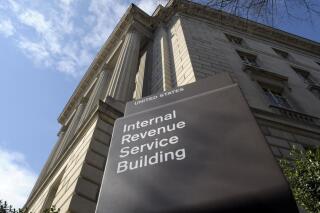Posts, campaign ads distort IRS funding

The exterior of the Internal Revenue Service (IRS) building in Washington, on March 22, 2013. On October 11, 2022, The Associated Press reported on revived false claims about IRS funding in the Inflation Reduction Act. (AP Photo/Susan Walsh, File)
CLAIM: Democratic senators in summer 2022 voted to hire an army of 87,000 IRS agents who will audit and harass the middle class.
AP’S ASSESSMENT: Partly false. The Inflation Reduction Act, passed in July, provides funding to potentially hire that many IRS employees over the next decade as existing employees quit and retire, but the new employees will not all be hired at the same time and many will not be auditors. Audit rates for those earning less than $400,000 are not expected to rise in relation to historic norms, according to the Treasury Department.
THE FACTS: As the midterm elections near, Republican candidates and political action committees are sharing ads and social media posts that revive old falsehoods about a Senate vote earlier this year.
“Yes, every Democrat voted to hire 87K new IRS agents to audit the middle class,” tweeted Stephen Miller, who served as a top aide to former President Donald Trump.
“Politician Cheri Beasley supported spending billions to hire 87,000 new IRS agents to audit the middle class,” read the text of a conservative group’s Facebook ad targeting the Democratic senate candidate from North Carolina.
But the Democratic-led Inflation Reduction Act didn’t create teams of armed auditors singling out middle-class taxpayers for enforcement, as posts claim.
Last year, before the bill emerged, the Treasury Department had proposed a plan to hire roughly 87,000 IRS employees over the next decade if it got the money. The IRS will be releasing final numbers for its hiring plans in the coming months, according to a Treasury official.
Many of the new hires will be replacing employees who are expected to quit or retire, experts and officials say.
The IRS currently has about 80,000 employees, including clerical workers, customer service representatives, enforcement officials, and others. The agency has lost roughly 50,000 employees over the past five years due to attrition, according to the IRS. More than half of IRS employees who work in enforcement are currently eligible for retirement, said Natasha Sarin, the Treasury Department’s counselor for tax policy and implementation.
Budget cuts, mostly demanded by Republicans, have also diminished the ranks of enforcement staff, which fell roughly 30% since 2010 despite the fact that the filing population has increased. The IRS-related money in the Inflation Reduction Act is intended to boost efforts against high-end tax evasion, Sarin said.
The nearly $80 billion for the IRS in the bill will also pay for other improvements, such as revamping the agency’s technology, said Janet Holtzblatt, a senior fellow at the Tax Policy Center and former Treasury official.
Claims that the agents will be “armed” or an “army” are also misleading, since only a small division of IRS criminal investigators carry weapons. These agents work on issues such as seizing illicit crypto currency and Russian oligarchs’ assets, Sarin said.
Slightly more than 2,000 such special agents were working at the IRS in 2021, according to agency documents. The branch will get money from the Inflation Reduction Act, but the bulk of the dollars will go toward other areas, according to Sarin.
The Treasury says it will hire experienced auditors and workers who will improve taxpayer services, and that audit rates for those earning less than $400,000 are not expected to rise in relation to historic norms.
___
This is part of AP’s effort to address widely shared misinformation, including work with outside companies and organizations to add factual context to misleading content that is circulating online. Learn more about fact-checking at AP.
